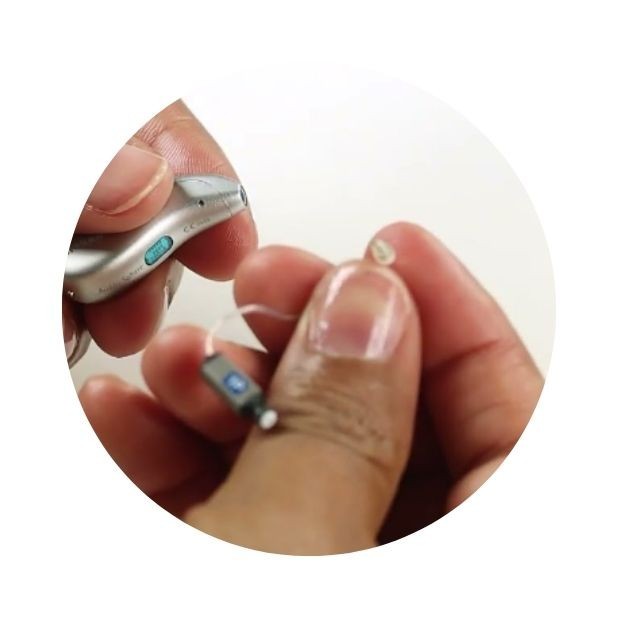
How do you know when to upgrade your hearing aids?
The signs to look out for
Upgrading hearing aids
It’s time to upgrade your hearing aids when they no longer meet your hearing needs, new models offer significantly better technology, or your current hearing aids are old and unreliable. Also, consider upgrading if your lifestyle has changed and you need better performance in different environments or improved connectivity features.
Many people don't realise that timely hearing aid upgrades can significantly improve daily communication, reduce listening fatigue, and enhance overall quality of life. On this page, we will look at when the right time to upgrade is, how often you should, the signs to look out for, and why you should consider it.
How often should you get new hearing aids?
Hearing aids are complex devices, and this is why it is good to know and understand when to consider upgrading them and purchasing a new pair. Generally, hearing aids are best upgraded every three to five years to enjoy the most recent and best technology the industry has to offer.
This might be when your hearing aids can't be repaired by a professional, or when you have had your hearing aids for a while, and they are not supporting your hearing like they used to. Hearing aids age over time and eventually become outdated. Regular hearing aid upgrades ensure you're benefiting from the latest innovations, such as artificial intelligence features, enhanced speech clarity, and superior background noise management.
Whatever the reason may be for considering an upgrade, even if they are working fine, here are some signs to look out for when it might be time to think about replacing your hearing aids:

Signs I should be upgrading my hearing aids
Guidance from our audiologists
There is a change in your overall health or hearing health
As our eye prescription changes, so do our hearing needs. As I mentioned earlier, you might find that your current hearing aids aren't supporting your hearing like they used to. For example, if you currently wear standard hearing aids and now you have a more profound hearing loss, your hearing needs would have changed and might be better supported with power or superpower hearing aids.
In regard to overall health, this can instigate hearing aid upgrades, too. For example, you might now have arthritis and, therefore, dexterity might be an issue. If you currently have In-Ear hearing aids, this requires a certain amount of fiddling with small battery changes. Putting them in your ears might also be a challenge.
In these scenarios, you might find that Behind-Ear hearing aids will be easier to put on, manage and maintain. Rechargeable hearing aids are also worth considering, as they require no battery changes at all and would give you the confidence you need, knowing you have the power you need all day.
Modern hearing aid upgrades are also designed with health changes in mind, offering features like tap controls, voice-activated assistants, and even fall detection in some models.
You have had your hearing aids for five years or more
As a rule of thumb, most hearing aids are due for an upgrade in around three to five years. If you're wondering why they don't last longer, it is all down to the natural wear and tear of the devices. However, lifespan does often depend on how well you maintain your hearing aids and how well they are built.
In reality, after three to five years, your hearing aids become old technology, and there are simply better, more efficient and advanced hearing aids out there. The advanced hearing aids of today are more fun, too. They easily connect to all your favourite Bluetooth devices, and there are also more discreet styles, fits and colours available.
Sticking with outdated technology could mean missing out on better sound clarity, improved noise filtering, and more reliable connectivity – all of which modern hearing aid upgrades offer as standard.
Other advanced technology examples might be:
- Connecting to multiple Bluetooth devices
- Hear a full soundscape with 360-degree directionality technology
- Compatible and programmable with smartphones
- Better amplification for speech in front of you
- Better processing power for wind and background noise reduction
- New beneficial features and settings to personalise your hearing experience

Replacing Your Hearing Aids
When should I upgrade my hearing aids?
Your financial position or lifestyle has changed
There might be a lifestyle change that has prompted the consideration of new hearing aids. For example, your current hearing aids might not meet your new needs and expectations. If you're now more active and need your hearing aids to keep up in different environments, especially with wind noise.
However, your lifestyle might be less active, or you might spend most of your time indoors, and you might now need to switch to simpler hearing aids, such as a basic model. This means you won't be paying for the features you don't use.
Or perhaps you are now able to afford more advanced hearing aids that will suit your needs better and replace the current ones you bought a few years ago on a smaller budget. On the other hand, your perception of hearing aids might have changed since you purchased your current ones.
From experience, people are a lot more reluctant and wary when they buy their first hearing aids. Now you might find that you've gained more confidence and know how it feels to hear your best, and now have a better idea of what you want.
With so many hearing aid upgrades available on the market today, it’s easier than ever to find one that complements both your budget and lifestyle, whether you're on the go or prefer a quieter pace.
What to do next
An audiologist can also show you the latest models and how hearing aid upgrades might benefit you, both in sound quality and ease of use. Don’t miss out on hearing the world as clearly as possible – it may be time to explore a better fit for your hearing future.
Discover how the latest technology can transform your hearing experience. Book a free consultation with a local audiologist today — at home or in the clinic — and find out which hearing aid upgrade is right for you here
Thinking of upgrading your hearing aids?
If you are considering upgrading your hearing aids, it is important to consult with your audiologist to determine the best solution for your individual needs. They can help you evaluate your current hearing needs and recommend hearing aids that are appropriate for your level of hearing loss and lifestyle.
It is also important to consider the cost of upgrading your hearing aids. Newer models may be more expensive than your current devices, and you may need to pay for any additional features or technology that you want.
Our specialist service includes:
Do not spend hundreds of pounds without getting a second opinion from us.
Please call us on 0800 567 7621
 Not only are the prices great, but the service is fantastic! Many thanks to your team.
Not only are the prices great, but the service is fantastic! Many thanks to your team.What's included in our hearing aid prices?
Other pages you might find useful
FAQs
In general, any audiologist will always recommend to you the hearing aid model that best suits your needs. Here is a useful checklist to make sure that is the case.
- Audiologist's level of knowledge: The audiologist you have seen will hopefully have a wide knowledge of all available hearing aids; however, some will only be familiar with a small number of brands and, therefore, may not really be in a position to know which model is the best for you. It is OK to challenge their recommendation and ask them to justify why this particular brand is the one for you.
- Do research: Read about the hearing aid that was recommended. Does it seem like it will suit your lifestyle? Does it have more or fewer features than you need?
- Be aware of sales targets: Many high street retailers have specific tie-ins to a particular manufacturer/brand. The hearing aid they have suggested may still be the correct one for you, but do your research so that you know why they might have recommended it.
If you have significant hearing loss in both ears, you should be wearing two hearing aids. Here are the audiological reasons why:
Localisation: The brain decodes information from both ears and compares and contrasts them. By analysing the minuscule time delays as well as the difference in the loudness of each sound reaching the ears, the person is able to accurately locate a sound source.
Simply put, if you have better hearing on one side than the other, you can't accurately tell what direction sounds are coming from.
Less amplification is required: A phenomenon known as “binaural summation” means that the hearing aids can be set at a lower and more natural volume setting than if you wore only one hearing aid.
Head shadow effect: High frequencies, the part of your hearing that gives clarity and meaning to speech sounds, cannot bend around your head. Only low frequencies can. Therefore, if someone is talking on your unaided side, you are likely to hear that they are speaking, but be unable to tell what they have said.
Noise reduction: The brain has its own built-in noise reduction, which is only really effective when it is receiving information from both ears. If only one ear is aided, even with the best hearing aid in the world, it will be difficult for you to hear in background noise as your brain is trying to retain all of the sounds (including background noise) rather than filtering them out.
Sound quality: We are designed to hear in stereo. Only hearing from one side sounds a lot less natural to us.
Fancy some further reading on this topic? You can read about why two hearing aids are better than one in our article, hearing aids for Both Ears, here
For most people, the main benefit of a rechargeable hearing aid is simple convenience. We are used to plugging in our phones and other devices overnight for them to charge up. Here are some other pros and cons:
For anybody with poor dexterity or issues with their fingers, having a rechargeable aid makes a huge difference, as normal hearing aid batteries are quite small and some people find them fiddly to change.
One downside is that if you forget to charge your hearing aid, then it is a problem that can't be instantly fixed. For most, a 30-minute charge will get you at least two or three hours of hearing, but if you are the type of person who is likely to forget to plug them in regularly, then you're probably better off with standard batteries.
Rechargeable aids are also a little bit bigger and are only available in Behind-the-Ear models.
Finally, just like with a mobile phone, the amount of charge you get on day one is not going to be the same as you get a few years down the line. Be sure to ask what the policy is with the manufacturer's warranty when it comes to replacing the battery.
For most people, the answer is yes. But it's never that simple.
The majority of hearing problems affect the high frequencies a lot more than the low ones. Therefore, open fitting hearing aids sound a lot more natural and ones that block your ears up can make your own voice sound like you are talking with your head in a bucket. Therefore, in-ear aids tend to be less natural.
However, the true answer is we can't tell until we have had a look in your ears to assess the size of your ear canal, and until we have tested your hearing to see which frequencies are being affected.
People with wider ear canals tend to have more flexibility, also there are open fitting modular CIC hearing aids now that do not block your ears.
There is also the age-old rule to consider, that a hearing aid will not help you if it's sat in the drawer gathering dust. If the only hearing aid you would be happy wearing is one that people can't see, then that's what you should get.
Most people can adapt to any type of hearing aid, as long as they know what to expect. Have an honest conversation with your audiologist as to what your needs are.
Generally speaking, six or more. Unless it's none at all. The number of channels a hearing aid has is often a simplistic way an audiologist will use to explain why one hearing aid is better than another, but channels are complex, and it is really not that straightforward. Here are some reasons why:
Hearing aids amplify sounds of different frequencies by different amounts. Most people have lost more high frequencies than low, and therefore need more amplification in the high frequencies. The range of sounds you hear is split into frequency bands or channels, and the hearing aids are set to provide the right amount of hearing at each frequency level.
Less than six channels, and this cannot be done with much accuracy, so six is the magic number. However, a six-channel aid is typically very basic with few other features and is suitable only for hearing a single speaker in a quiet room. The number of channels is not what you should be looking at; it's more the rest of the technology that comes with them.
As a final note, different manufacturers have different approaches. One method is not necessarily better than any other. For example, some manufacturers have as many as 64 channels in their top aids. Most tend to have between 17 and 20. One manufacturer has no channels at all.
Manufacturer's warranties typically last between 2-5 years, depending on the brand and model, and cover defects in materials and workmanship. This includes repairs for component failures, electronic malfunctions, and manufacturing defects, but excludes damage from misuse, accidents, or normal wear. Most manufacturers also include loss and damage insurance for the first year.
We handle all warranty claims on your behalf, liaising with manufacturers and ensuring you get replacement devices quickly when needed. This comprehensive warranty coverage, combined with our lifetime aftercare, gives you complete peace of mind.
Our hearing tests are completely free, whether at our clinics or in your home. Unlike other providers who charge £30-£100 for home visits, we believe hearing healthcare should be accessible without financial barriers. Our comprehensive assessments include examination by a registered audiologist, audiogram results, and personalised recommendations.
All testing, future adjustments, and ongoing support are included at no extra cost. While NHS tests are also free, typical 6-week waiting periods often lead people to seek immediate private testing. We provide prompt, professional assessments that fit your schedule and budget.
Yes, we offer completely free home visits throughout the UK, and this service is included in our prices with no additional charges. Home visits are particularly valuable for people with mobility issues, busy schedules, or those who simply prefer the comfort and convenience of their own environment.
Our audiologists can conduct full hearing tests, fit hearing aids, and provide ongoing support in your home. This service sets us apart from many providers who either don't offer home visits or charge extra for them.
We can offer prices up to 40% lower than high street retailers because of our business model. As a network of 200+ independent audiologists, we don't have the massive overheads of large retail chains - no expensive high street premises, no sales targets pushing audiologists to sell the most expensive options, and no costly marketing campaigns.
However, we maintain the same buying power as the big chains because we purchase on behalf of our entire nationwide network. This means you get access to the same premium hearing aids with professional service, but at genuinely competitive prices.
We offer a comprehensive 60-day money-back guarantee, which gives you twice the industry standard time to properly assess whether your hearing aids are right for you. This extended period recognises that adjusting to hearing aids takes time, and your brain needs several weeks to adapt to the amplified sounds.
Unlike many providers who offer just 30 days, we believe 60 days gives you the confidence to test your hearing aids in all the situations that matter to you - from quiet conversations at home to busy restaurants and outdoor activities.
Ask the Experts
6 Morton Lane
Walkwood
Redditch
Worcestershire
B97 5QA
Latest Launch
When we refer to a product as 'Latest Launch', we mean it is the latest to be released on the market.
New
When we refer to a product as 'New', we mean that the product is the newest hearing aid model on the market.
When we refer to a product as 'Superseded', we mean that there is a newer range available which replaces and improves on this product.
Older Model
When we refer to a product as an 'Older Model', we mean that it is has been superseded by at least two more recent hearing aid ranges.

